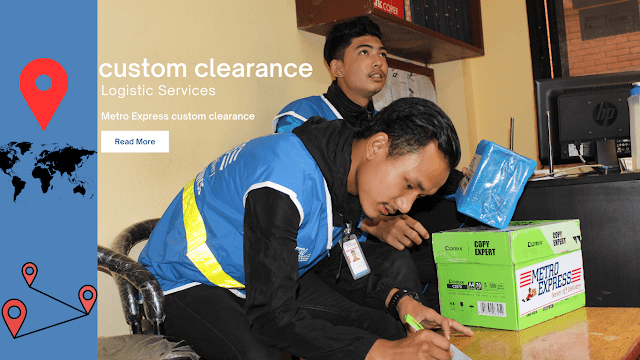Metro Express Logistic custom clearance refers to the process of clearing goods through customs when they are being transported internationally. It involves complying with various customs regulations, and documentation requirements, and paying any applicable duties, taxes, or fees.
Here are the critical steps involved in logistic custom clearance:
Documentation: The first step is to ensure that all necessary documentation is prepared accurately. This may include commercial invoices, packing lists, bills of lading or airway bills, customs declaration forms, and any other specific documents required by the customs authorities.
Customs Entry: Customs entry is the formal declaration of the goods to the customs authorities of the importing country. The customs entry includes information about the nature, quantity, value, and origin of the goods. The entry can be submitted electronically or manually, depending on the customs requirements of the country.
Duties and Taxes: The customs authorities assess applicable duties, taxes, and fees based on the value, classification, and country of origin of the goods. Importers are responsible for paying these charges unless specific exemptions or preferential trade agreements apply.
Customs Examination: Customs authorities may choose to inspect the goods to verify the declared information, ensure compliance with regulations, and detect any prohibited or restricted items. The examination can be done through physical inspection, X-ray scanning, or other methods.
Clearance Process: Once the customs authorities are satisfied with the documentation and examination results, they issue a customs release, allowing the goods to proceed. The customs release can be obtained electronically or by presenting physical documents.
Delivery: The goods can be delivered to the final destination after customs clearance. This involves arranging transportation, coordinating with carriers, and managing logistics until the goods reach their intended recipients.
It's important to note that the customs clearance process can vary depending on the country, type of goods, and specific regulations. It's advisable to work with experienced customs brokers or freight forwarders who have expertise in navigating the customs procedures of different countries to ensure a smooth logistics custom clearance process.
Metro Express Logistic custom clearance....
Anil Thapa
June 10, 2023
service
Subscribe Us
Popular Posts

harmonized system code nepal...
June 06, 2024

courier services near me.........................
May 21, 2024
Contact Info
contact us to know more about our services.Metro Express
Contact List
Lazimpat, Kathmandu-44600 Nepal
E-mail:official@metroexpress.com.np
01-5921659/9801081417
Contact form
Copyright (c) 2025 Metro Express All Right Reserved
Created By Blogger Developer | Distributed By Gooyaabi Themes



0 Comments